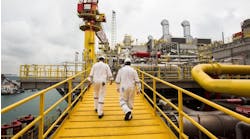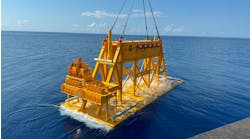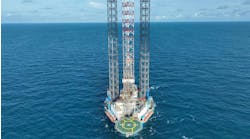Shell, Equinor agree to merge UK North Sea E&P portfolios
EXCLUSIVE CONTENT:
2024 Executive Perspectives Special Report
In this 3rd annual report, industry leaders identify the challenges and solutions, trending technologies, top projects, and the path forward for the offshore oil and gas industry. Download the full report (it's FREE).
By Jeremy Beckman, London Editor
Shell UK and Equinor UK have agreed to combine their UK offshore oil and gas interests to form a new company.
The incorporated joint venture (JV), based in Aberdeen, will be the UK’s largest independent offshore oil and gas producer, they claim, with each company owning a 50% share.
It will invest to ensure a long-term future for the various oil and gas fields and platforms in the portfolio. This will include:
- Equinor’s equity interests in the Mariner, Rosebank and Buzzard fields in the Shetlands area and the central North Sea; and
- Shell’s equity interests in Shearwater, Penguins, Gannet, Nelson, Pierce, Jackdaw (all central North Sea), Penguins (northern North Sea), Victory, Clair and Schiehallion (all west of Shetland).
The transaction also combines various exploration licenses held by the two companies. Subject to approvals, it should complete by the end of next year.
Equinor said the JV would lead to a short-term increase in its production and cash flow, while the more balanced ownership structure of the interest should reduce the overall risk exposure.
According to Philippe Mathieu, vice president of Exploration and Production International, “Equinor has been a reliable energy partner to the UK for over 40 years, providing oil and gas, developing the offshore wind industry, and advancing decarbonization…
“By combining Equinor’s and Shell’s long-standing expertise and competitive assets, this new entity will play a crucial role in securing the UK’s energy supply.”
Shell’s Integrated Gas and Upstream director Zoë Yujnovich added, “Domestically produced oil and gas is expected to have a significant role to play in the future of the UK’s energy system.”
Equinor currently produces about 38,000 boe/d from its North Sea fields, while Shell UK produces more than 100,000 boe/d. The combined company should deliver more than 140,000 boe/d in 2025.
Various UK North Sea assets will not be transferred to the new JV. Equinor will retain ownership of its Utgard, Barnacle and Statfjord, all producing to infrastructure on the Norwegian side of the median line.
Also not included are the company’s Sheringham Shoal, Dudgeon, Hywind Scotland and Dogger Bank offshore wind farm interests, and its UK hydrogen, carbon capture and storage (CCS), power generation, battery storage and gas storage assets.
Shell UK will retain ownership of its interests in the Fife NGL plant and St Fergus gas terminal in eastern Scotland, along with two floating wind projects under development, MarramWind and CampionWind. In addition, Shell UK will remain technical developer of the offshore/onshore Acorn CCS project in Scotland.
At present, the two companies employ about 1,300 people in total in oil and gas roles in the UK.
According to David Mirzai, energy research analyst with SP Angel Energy, a division of SP Angel Corporate Finance LLP, there is potential for increased M&A activity in the UK upstream sector following the new Labour government’s recent regulatory and fiscal changes for what is a mature basin with falling production.
The proposed combination would provide growth potential from Equinor’s Rosebank oil and gas development west of Shetland, and enable fiscal synergies from the offset of Equinor UK’s multi-billion tax loss position.
However, Greenpeace is contesting the previous Conservative government’s approval of Rosebank and Shell’s Jackdaw gas-condensate development projects in central North Sea.
It follows a Supreme Court ruling earlier this year that the authorities must consider Scope 3 emissions from fossil fuel use, not just extraction (Scope 1 & 2), when assessing new North Sea projects.
The transaction, Mirzai pointed out, follows the E&P combinations established between Aker/BP and Vår Energi/Eni offshore Norway; Ithaca/Eni in the UK; and bp/Eni in Angola (Azule Energy).
The majors appear to have taken the view that separated entities can independently access capital markets to finance their growth, enhancing their appeal to specialist investors.
At the same time, increasingly negative sentiment in the UK toward offshore oil and gas investment climate has led to some established E&P companies to look to shift their investment elsewhere.
SP Angel Energy expects M&A activity to accelerate over the next 12 months as certain players pursue improved operational and fiscal synergies to strengthen the value of their UK portfolios.

Jeremy Beckman | Editor, Europe
Jeremy Beckman has been Editor Europe, Offshore since 1992. Prior to joining Offshore he was a freelance journalist for eight years, working for a variety of electronics, computing and scientific journals in the UK. He regularly writes news columns on trends and events both in the NW Europe offshore region and globally. He also writes features on developments and technology in exploration and production.



